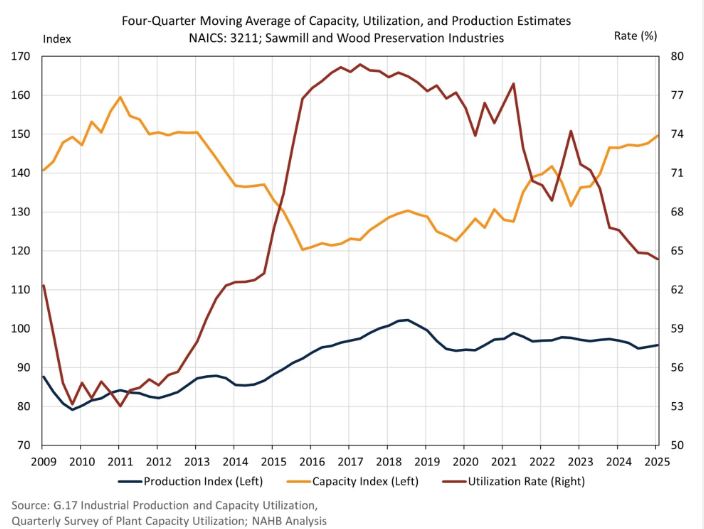
With tariffs on Canadian lumber, there has been a greater push
for U.S. sawmills to boost their lumber production. However,
according to the National Association of Home Builders,
utilization rates of U.S. sawmills are falling, meaning mills
technically have the capacity to make more lumber but aren’t
doing so. Among the reasons: many mills have reduced employment
over the years and don’t have enough workers to produce at
higher levels. Additionally, high prices and a more recent lack
of foreign competition have removed much of the incentive to
boost domestic production of lumber in favor of profitability.
In the first quarter of 2025, sawmill and wood preservation
firms continued to report lower capacity utilization coupled
with stagnant production. The utilization rate, a ratio of
actual production and potential production, was 64.4% in the
first quarter on a four-quarter moving average basis. The
utilization rate has continued to drop since 2017, as capacity
(or the capability to produce) has increased, but production has
remained lower than in 2018.

Based on the data above, sawmill capacity has increased from
2015 but remains lower than peak levels in 2011. Most of the
recent capacity gains took place in 2023, followed by little
gain over the course of 2024. As evident above, there is ample
room to increase production of domestic lumber, but current
production levels remain much unchanged over the past several
years. Looking at the Producer Price Index, lumber prices remain
higher than 2024. At current pricing levels, producers may see
no benefit of increasing output, as it would push prices lower
since demand has fallen from the start of the year. Notably,
even when prices were historically high in 2021 and 2022,
producers were unable to increase their production significantly
during these periods, potentially due to supply chain
disruptions.
Source:
eyeonhousing.org